小升初英语虚拟语气(三)专项讲解习题
虚拟语气讲解和练习(附答案)
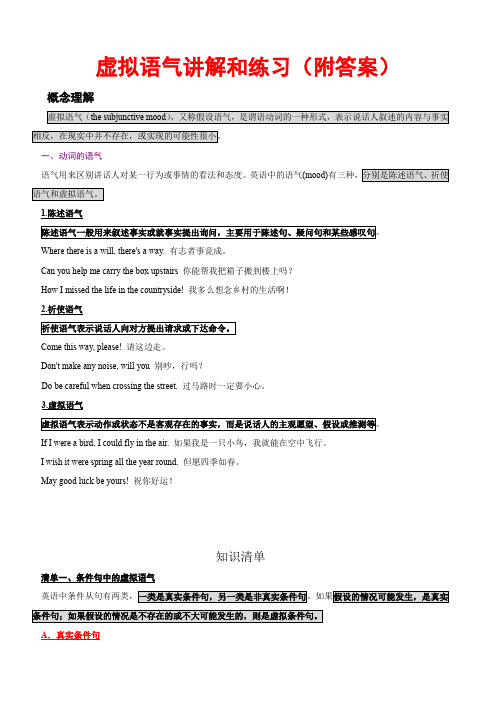
虚拟语气讲解和练习(附答案)概念理解一、动词的语气语气用来区别讲话人对某一行为或事情的看法和态度。
英语中的语气(mood)1.陈述语气Where there is a will, there's a way. 有志者事竟成。
Can you help me carry the box upstairs 你能帮我把箱子搬到楼上吗?How I missed the life in the countryside! 我多么想念乡村的生活啊!2.祈使语气Come this way, please! 请这边走。
Don't make any noise, will you 别吵,行吗?Do be careful when crossing the street. 过马路时一定要小心。
3.虚拟语气If I were a bird, I could fly in the air. 如果我是一只小鸟,我就能在空中飞行。
I wish it were spring all the year round. 但愿四季如春。
May good luck be yours! 祝你好运!知识清单清单一、条件句中的虚拟语气A.真实条件句If he doesn't come at 8, we won't wait for him. 如果他八点不来,我们就不等他了。
If a flood happened in the past, there was usually a great loss of life and property. 过去发生洪水的话,常有很大的生命和财产损失。
We shall go there unless it rains tomorrow. 如果明天不下雨,我们将去那里。
I'll let you use my bike on condition that you keep it clean. 如果你能保持车子干净,我就让你用我的自行车。
英语虚拟语气练习题及答案解析---

英语虚拟语气练习题及答案解析1.The judge ordered that the thief _____ punished.A. would beB. should beC. were to beD. must be答案:B解析:译文:法官命令惩罚这个小偷。
本题考查should do虚拟。
表命令、建议等词,后面的从句谓语要用should do,should可以省略,故选B。
2.If the United States had not entered the Second World War, probably the 1940 unemployment rate of 14% _____ still further.A. would riseB. would risenC. would have risenD. had risen答案:C解析:译文:如果美国没有加入二战,可能1940年的失业率会进一步上升。
本题考查if引导的非真实条件句。
根据had not entered可知句子对过去虚拟,主句要用would/should/might/could+ have done,故选C。
3.I wish I _____ you yesterday.A. sawB. did seeC. had seenD. were to see答案:C解析:译文:我多希望我昨天能见到你。
本题考查虚拟语气。
Wish后面的句子要用虚拟语气,对过去虚拟用had done,对现在虚拟用did/were,对将来虚拟用would do/could do。
根据yesterday可知对过去虚拟,故选C。
4.Without electricity, human being life _____ quite different today.A. wouldB. will beC. would have beenD. would be答案:D解析:译文:没有电的话,人类如今的生活会大不一样。
初中虚拟语气(清晰版)
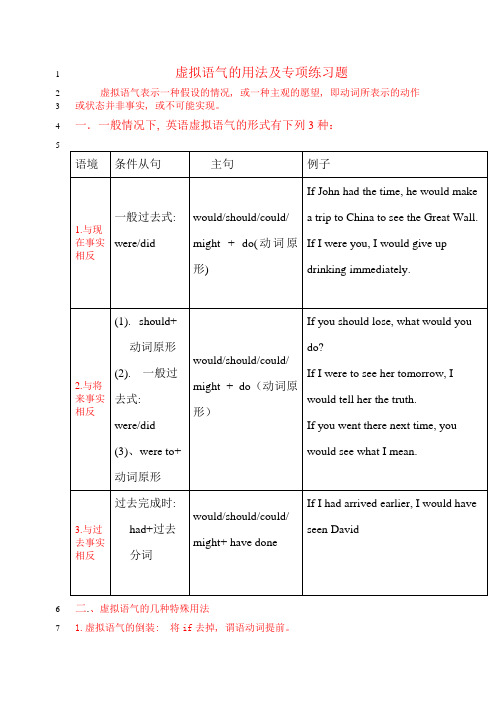
虚拟语气的用法及专项练习题1虚拟语气表示一种假设的情况, 或一种主观的愿望, 即动词所表示的动作2或状态并非事实, 或不可能实现。
3一.一般情况下, 英语虚拟语气的形式有下列3种:45二.、虚拟语气的几种特殊用法61.虚拟语气的倒装: 将if去掉, 谓语动词提前。
7●如:8I..wer.you..woul.giv.u.drinking.=Wer..you..woul.giv.u.drinking.9●I..ha.arrive.earlier..woul.hav.see.David..Ha..arrive.earlier..woul.hav.se10e.David.112. 有时条件从句中的动作和主句中的动作发生的时间不一致, 如:12If he had followed the doctor’s advice, he would be quite all right now.13(if从句是对过去的虚拟, 主句是对现在的虚拟。
)14If I were you, I would have gone home.15(if从句是对现在的虚拟, 主句是对过去的虚拟。
)1617注意: 在此结构中that不可省略;should省不省均可。
18He suggested that they (should ) stop smoking.19上述动词的名词形式出现时, that 引导的从句仍用虚拟语气。
20He made a request that they (should ) stop smoking.21注意:22* insist有两个意思, 当表示“坚持让某人做某事”(含命令口吻)时, 23that从句用虚拟, 如: He insists that we (should) go home now.24当表示“坚持某种说法”时, that从句用陈述语气。
25He insists that he is right.2627It is important that you (should) follow the doctor’s o rders.28It is right that you should have done your homework.29注意: wish与hope接宾语从句的区别在于: hope表示一般可以实现的30希望, 宾语从句用陈述语气。
英语语法专项:虚拟语气用法详解及练习(附答案)
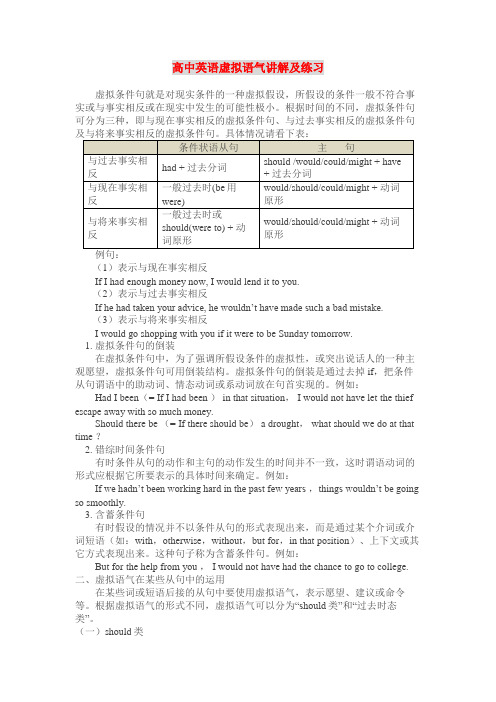
高中英语虚拟语气讲解及练习虚拟条件句就是对现实条件的一种虚拟假设,所假设的条件一般不符合事实或与事实相反或在现实中发生的可能性极小。
根据时间的不同,虚拟条件句可分为三种,即与现在事实相反的虚拟条件句、与过去事实相反的虚拟条件句(1)表示与现在事实相反If I had enough money now, I would lend it to you.(2)表示与过去事实相反If he had taken your advice, he wouldn’t have made such a bad mistake.(3)表示与将来事实相反I would go shopping with you if it were to be Sunday tomorrow.1. 虚拟条件句的倒装在虚拟条件句中,为了强调所假设条件的虚拟性,或突出说话人的一种主观愿望,虚拟条件句可用倒装结构。
虚拟条件句的倒装是通过去掉if,把条件从句谓语中的助动词、情态动词或系动词放在句首实现的。
例如:Had I been(= If I had been ) in that situation, I would not have let the thief escape away with so much money.Should there be (= If there should be) a drought, what should we do at that time ?2. 错综时间条件句有时条件从句的动作和主句的动作发生的时间并不一致,这时谓语动词的形式应根据它所要表示的具体时间来确定。
例如:If we hadn’t been working hard in the past few years ,thing s wouldn’t be going so smoothly.3. 含蓄条件句有时假设的情况并不以条件从句的形式表现出来,而是通过某个介词或介词短语(如:with,otherwise,without,but for,in that position)、上下文或其它方式表现出来。
小升初英语虚拟语气练习题和答案解析
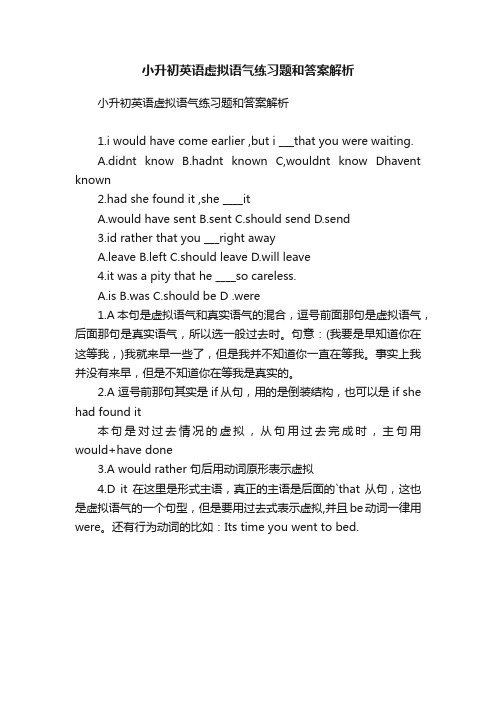
小升初英语虚拟语气练习题和答案解析小升初英语虚拟语气练习题和答案解析1.i would have come earlier ,but i ___that you were waiting.A.didnt knowB.hadnt known C,wouldnt know Dhavent known2.had she found it ,she ____itA.would have sentB.sentC.should sendD.send3.id rather that you ___right awayA.leaveB.leftC.should leaveD.will leave4.it was a pity that he ____so careless.A.isB.wasC.should be D .were1.A 本句是虚拟语气和真实语气的混合,逗号前面那句是虚拟语气,后面那句是真实语气,所以选一般过去时。
句意:(我要是早知道你在这等我,)我就来早一些了,但是我并不知道你一直在等我。
事实上我并没有来早,但是不知道你在等我是真实的。
2.A 逗号前那句其实是if从句,用的是倒装结构,也可以是if she had found it本句是对过去情况的虚拟,从句用过去完成时,主句用would+have done3.A would rather 句后用动词原形表示虚拟4.D it在这里是形式主语,真正的主语是后面的`that从句,这也是虚拟语气的一个句型,但是要用过去式表示虚拟,并且be动词一律用were。
还有行为动词的比如:Its time you went to bed.。
虚拟语气讲解及练习题(含答案和解释)

高中英语虚拟语气讲解及练习虚拟条件句就是对现实条件的一种虚拟假设,所假设的条件一般不符合事实或与事实相反或在现实中发生的可能性极小。
根据时间的不同,虚拟条件句可分为三种,即与现在事实相反的虚拟条件句、与过去事实相反的虚拟条件句(1)表示与现在事实相反If I had enough money now, I would lend it to you.(2)表示与过去事实相反If he had taken your advice, he wouldn’t have made such a bad mistake.(3)表示与将来事实相反I would go shopping with you if it were to be Sunday tomorrow.1. 虚拟条件句的倒装在虚拟条件句中,为了强调所假设条件的虚拟性,或突出说话人的一种主观愿望,虚拟条件句可用倒装结构。
虚拟条件句的倒装是通过去掉if,把条件从句谓语中的助动词、情态动词或系动词放在句首实现的。
例如:Had I been(= If I had been ) in that situation, I would not have let the thief escape away with so much money.Should there be (= If there should be) a drought, what should we do at that time ?2. 错综时间条件句有时条件从句的动作和主句的动作发生的时间并不一致,这时谓语动词的形式应根据它所要表示的具体时间来确定。
例如:If we hadn’t been working hard in the past few years ,thing s wouldn’t be going so smoothly.3. 含蓄条件句有时假设的情况并不以条件从句的形式表现出来,而是通过某个介词或介词短语(如:with,otherwise,without,but for,in that position)、上下文或其它方式表现出来。
(完整版)虚拟语气讲解及练习题(含答案和解释)

(完整版)虚拟语气讲解及练习题(含答案和解释)虚拟语气讲解与练习黄志刚2013.10.一. 简介虚拟语气用来表示说话人的主观愿望或假想,而不表示客观存在的事实,所说的是一个条件,不一定是事实,或与事实相反。
虚拟语气通过谓语动词的特殊形式来表示。
英语中的语气分为陈述语气、祈使语气、虚拟语气在什么情况下用虚拟语气? 在表示虚假的、与事实相反的或难以实现的情况时用虚拟语气,表示主观愿望或表示某种强烈情感时,也用虚拟语气。
即当一个人说话时欲强调其所说的话是基于自己的主观想法,而不是根据客观实际,就用虚拟语气。
二. 虚拟语气在非真实条件状语从句中的用法1、真实条件状语从句与非真实条件状语从句真:eg . If he doesn’t hurry up, he will miss the bus. 如果他不快点,他将错过巴士。
( 真实条件状语)(不是虚拟语气)If he is free, he will ask me to tell stories. 如果他是空闲的,他会要求我讲故事。
(真实条件状语)(不是虚拟语气)非真:eg. If I were you, I would go at once.如果我是你,我马上就会去。
(非真实条件状语从句)If there were no air, people would die. 如果没有空气,人就会死亡。
(非真实条件状语从句)2、用法及动词形式1、表示与现在事实相反的情况,例1.If I were you, I would take an umbrella.如果我是你,我会带把伞。
(事实:我不可能是你) 2.If I knew his telephone number, I would tell you. 如果我知道他的电话号码,我就会告诉你。
(事实:不知道) 3.If there were no air orwater, there would be no living things on the earth. 如果没有水和空气,地球上就不会有生物。
初中虚拟语气讲解及专项练习与答案(带解析)
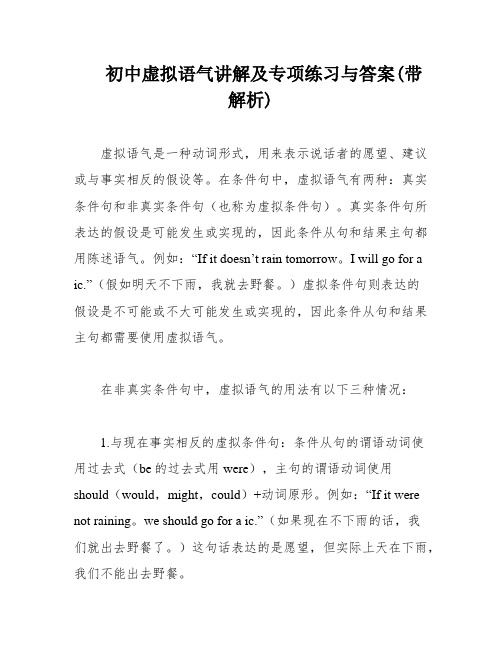
初中虚拟语气讲解及专项练习与答案(带解析)虚拟语气是一种动词形式,用来表示说话者的愿望、建议或与事实相反的假设等。
在条件句中,虚拟语气有两种:真实条件句和非真实条件句(也称为虚拟条件句)。
真实条件句所表达的假设是可能发生或实现的,因此条件从句和结果主句都用陈述语气。
例如:“If it doesn’t rain tomorrow。
I will go for a ic.”(假如明天不下雨,我就去野餐。
)虚拟条件句则表达的假设是不可能或不大可能发生或实现的,因此条件从句和结果主句都需要使用虚拟语气。
在非真实条件句中,虚拟语气的用法有以下三种情况:1.与现在事实相反的虚拟条件句:条件从句的谓语动词使用过去式(be的过去式用were),主句的谓语动词使用should(would,might,could)+动词原形。
例如:“If it were not raining。
we should go for a ic.”(如果现在不下雨的话,我们就出去野餐了。
)这句话表达的是愿望,但实际上天在下雨,我们不能出去野餐。
2.与过去事实相反的虚拟条件句:条件从句的谓语动词使用had+过去分词,主句的谓语动词使用should(would,might,could)+have+过去分词。
例如:“If he had come here。
he might have been able to help you.”(如果他来过这里,他或许能够帮助你。
)这句话表达的是对过去事实的假设,但实际上他没有来这里,他也没有帮助你。
3.与将来事实可能相反的虚拟条件句:条件从句的谓语动词可以使用动词过去式(be的过去式用were)、should+动词原形或were to+动词原形,主句的谓语动词使用should (would,might,could)+动词原形。
例如:“If it should rain tomorrow。
XXX.”(如果明天下雨的话,我们就取消野餐计划。
初中虚拟语气讲解练习及答案(可编辑修改word版)
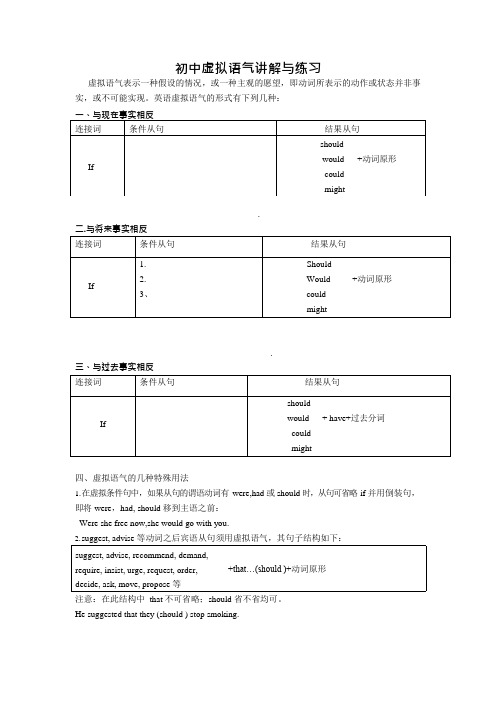
初中虚拟语气讲解与练习虚拟语气表示一种假设的情况,或一种主观的愿望,即动词所表示的动作或状态并非事实,或不可能实现。
英语虚拟语气的形式有下列几种:.二.与将来事实相反.三、与过去事实相反四、虚拟语气的几种特殊用法1. 在虚拟条件句中,如果从句的谓语动词有 were,had 或 should 时,从句可省略 if 并用倒装句,即将 were ,had, should 移到主语之前: Were she free now,she would go with you.2. s uggest, advise 等动词之后宾语从句须用虚拟语气,其句子结构如下:注意:在此结构中 that 不可省略;should 省不省均可。
He suggested that they (should ) stop smoking.suggest, advise, recommend, demand, require, insist, urge, request, order, decide, ask, move, propose 等+that…(should )+动词原形上述动词的名词形式出现时,that 引导的从句仍用虚拟语气。
He made a request that they (should ) stop smoking.如果that 引导的从句所表达的内容是事实,也可用陈述语气。
He insists that he is right.3、wish 的用法动词过去式或were—与现在事实相反主语+wish(that)+主语+ 动词过去完成式—与过去事实相反助动词过去试+动词原形—与将来事实相反I wish I were a pop singer. (=I am sorry I am not a pop singer..)I wish I had never stopped teaching. (=I am sorry I stopped teaching.)I wish they’d let us get some sleep.虚拟语气练习(1).If I you, I would go by plane. Flying is much faster.A.beB. wasC. wereD. am(2).I do not think those people are really English. If they were, they speak with French accents.A.don'tB. will notC. mustn'tD. wouldn't(3) today, would we be able to get there by Tuesday?A. Were we leavingB. If we leaveC. Would we leaveD. Were we to leave(4). If Jone tomorrow, what would you do?A. were not to comeB. will not comeC. would not comeD. had not come(5). “She didn't ask me, so I didn't help her?”“You mean to say , you would've helped her ?”A. if she asked youB. if she were to ask youC.had she asked you C. were she to ask you(6).They took the injured straight to the hospital. Otherwise some of them .A. might have diedB. might dieC. would dieD. could die(7). If they had known him, to him?A. would they have talkedB. would they talkC.had they talkedD. they would talk(8).If I lived in the city, I travel in crowded buses, but I to see lots of films.A. shall have to/shall be ableB. shall have to/am ableC. would have to/were ableD. would have to/would be able(9). I would have gone to the concert, if I time.A. had hadB. have hadC. hadD. would have had(10). I know it, I would have told you.A. HaveB. IfC. HadD. Having(11).your help, I would not have succeeded.A. BecauseB. Because ofC. ButD. But for(12). “What did Mr Smith say about his career?”“Only that if he a millionaire, he would have fewer worries.”A. did not becomeB. had not becomeC. does not becomeD. has not become(13). “Why didn't you help him?”“I would have I didn't have the money.”A. stillB. butC. otherwiseD. or(14). “Who should go to see Li Ying? He is ill today.”“I suggest Wang Hong .”A. goesB. would goC. goD. went(15).The housemaster was strict. He requested that we television on week nights.A. not watchB. must not to watchC. not be watchingD. have not watch(16). I can't speak Japanese, but I do wish I .A. canB. couldC. hadD. speak(17). “Are you enjoying your stay here?’“Yes, very much. I wish I have to leave so soon.”A. won'tB. don'tC. mustn'tD. didn't(18). “What will you do during the summer holidays?”“I don't know, but it's about time on something.”A. I'm decidingB. I'll decideC. I decidedD. I'd decided(19). I'd rather you anything about it for the time being.A. sayB. didn't sayC. don't sayD. not say(20).“Why do you have to be there at six?”“The teacher demands that everyone in his seat at six.”A. would beB. can beC. beD. will be(21). He makes a note of the assignment lest he it.A. forgetsB. forgetC. will forgetD. will not forget(22). “how does the librarian act?”“He acts as if he a walking dictionary.”A. wereB. beC. isD. has been(23).There is a law that drunken drivers severely punished.A. wereB. areC. beD. will be(24). I wish you interrupt when I'm talking on the phone.A. will notB. would notC. do notD. did not(25). Henry talks to his dog as if it him.A. understandsB. understoodC. understandD. would understand(26). Jeff looked as if he a ghost.A. sawB. has seenC. had seenD. would see(27). Give her my best regards, .A. should you see her todayB. if you saw her todayC. if you would see her todayD. should you have seen her today(28).There was a suggestion by the teachers that the meeting postponed for a week.A.had beenB. would beC. wasD. should be(29).It is highly desirable that every effort to reduce pollution in Bei jing.A.was madeB. be madeC. will be madeD. would be made(30).The manager would rather that his wife work in the same office as he dose.A.does notB. did notC. would notD. will not(31). The teacher insisted that we all back by two o'clock.A. beB. to beC. would beD. shall be(32). I didn't go to the football match, but I do wish I there.A. wentB. wasC. wereD.had been(33). It is high time we drug trafficking.(贩毒)A. did away withB. do away withC. did awayD. should do away with参考答案(1)C (2) D (3) D (4) A (5) C (6) A (7) A (8) D (9) A (10) C (11) D (12) B (13) B (14) C (15) A (16) B (17) D (18) C (19) B(20) C (21) B (22) A (23) C (24) B (25) B (26) C (27) A (28) D(29) B (30) B (31) A (32) D (33) A。
虚拟语气的习题带答案

虚拟语气的习题带答案虚拟语气的习题带答案虚拟语气是汉语语法中的一种特殊语气,用来表示说话人所说的话并不是事实或现实情况。
它在表达假设、愿望、建议、命令等方面起到重要的作用。
下面是一些虚拟语气的习题,带有详细的答案解析。
习题一:选择正确的虚拟语气形式填空。
1. 如果我______(是)你,我会接受这个工作机会。
答案:是。
虚拟语气表示对现实情况的假设。
2. 我希望他______(能)早点回来。
答案:能。
虚拟语气表示对现实情况的愿望。
3. 如果明天不下雨,我们______(去)郊游。
答案:去。
虚拟语气表示对未来情况的假设。
4. 老师建议我们______(多)读书。
答案:多。
虚拟语气表示对现实情况的建议。
5. 如果你______(有)时间,我请你吃饭。
答案:有。
虚拟语气表示对现实情况的假设。
习题二:根据句意,选择正确的虚拟语气形式填空。
1. 她希望她______(能)和你一起去旅行。
答案:能。
表示对现实情况的愿望。
2. 如果我______(是)你,我会好好珍惜这次机会。
答案:是。
表示对现实情况的假设。
3. 如果他______(有)时间,他会来参加聚会的。
答案:有。
表示对现实情况的假设。
4. 我们建议你______(多)锻炼身体。
答案:多。
表示对现实情况的建议。
5. 如果他______(知道)这个消息,他会很高兴的。
答案:知道。
表示对现实情况的假设。
习题三:根据句意,选择正确的虚拟语气形式填空。
1. 如果他______(知道)这个消息,他会很伤心的。
答案:知道。
表示对现实情况的假设。
2. 我们希望明天的天气______(好)一点。
答案:好。
表示对现实情况的愿望。
3. 如果我______(是)你,我会好好学习。
答案:是。
表示对现实情况的假设。
4. 我们建议他______(多)和同学们交流。
答案:多。
表示对现实情况的建议。
5. 如果你______(有)时间,我请你吃饭。
答案:有。
表示对现实情况的假设。
答案解析:虚拟语气是一种非现实的语气,用来表达假设、愿望、建议、命令等。
虚拟语气讲解及练习(有答案)
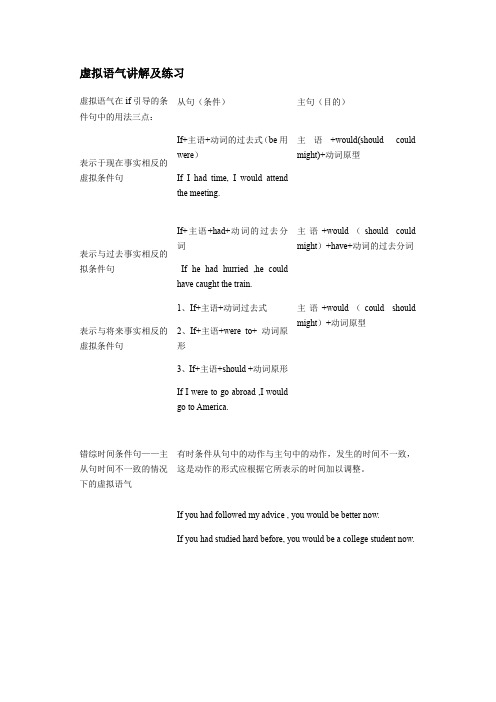
虚拟语气讲解及练习虚拟语气在if引导的条件句中的用法三点:从句(条件)主句(目的)表示于现在事实相反的虚拟条件句If+主语+动词的过去式(be用were)If I had time, I would attendthe meeting.主语+would(should couldmight)+动词原型表示与过去事实相反的拟条件句If+主语+had+动词的过去分词If he had hurried ,he couldhave caught the train.主语+would(should couldmight)+have+动词的过去分词表示与将来事实相反的虚拟条件句1、If+主语+动词过去式2、If+主语+were to+ 动词原形3、If+主语+should +动词原形If I were to go abroad ,I wouldgo to America.主语+would(could shouldmight)+动词原型错综时间条件句——主从句时间不一致的情况下的虚拟语气有时条件从句中的动作与主句中的动作,发生的时间不一致,这是动作的形式应根据它所表示的时间加以调整。
If you had followed my advice , you would be better now.If you had studied hard before, you would be a college student now.though引导的方式状语从句中表示与将来事实相反,(表示将来的可能性不大),用would (might, could)+动词原形He acts as if he could win in the game .注意:1.在as if/as though 句中,如果有可能成为事实,用陈述语气。
例:He looks as if he going to be ill.2.as though或as if引导的状语从句,从句主语和主句主语相同时,从句中可省略主语和部分谓语。
虚拟语气讲解及练习题(含答案和解释)
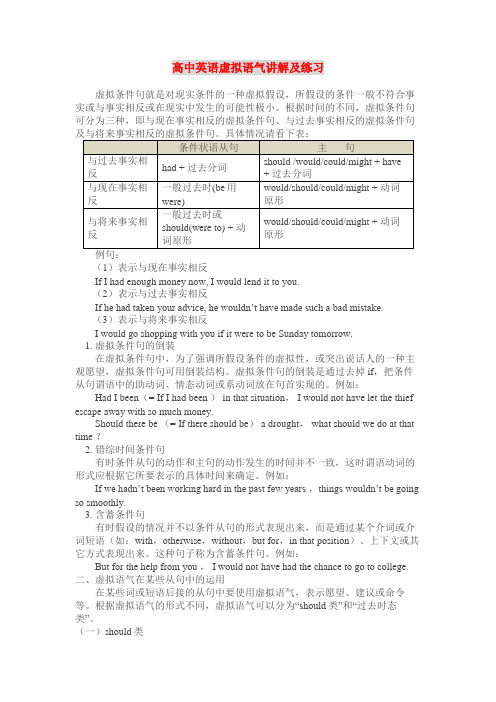
高中英语虚拟语气讲解及练习虚拟条件句就是对现实条件的一种虚拟假设,所假设的条件一般不符合事实或与事实相反或在现实中发生的可能性极小。
根据时间的不同,虚拟条件句可分为三种,即与现在事实相反的虚拟条件句、与过去事实相反的虚拟条件句(1)表示与现在事实相反If I had enough money now, I would lend it to you.(2)表示与过去事实相反If he had taken your advice, he wouldn’t have made such a bad mistake.(3)表示与将来事实相反I would go shopping with you if it were to be Sunday tomorrow.1. 虚拟条件句的倒装在虚拟条件句中,为了强调所假设条件的虚拟性,或突出说话人的一种主观愿望,虚拟条件句可用倒装结构。
虚拟条件句的倒装是通过去掉if,把条件从句谓语中的助动词、情态动词或系动词放在句首实现的。
例如:Had I been(= If I had been ) in that situation, I would not have let the thief escape away with so much money.Should there be (= If there should be) a drought, what should we do at that time ?2. 错综时间条件句有时条件从句的动作和主句的动作发生的时间并不一致,这时谓语动词的形式应根据它所要表示的具体时间来确定。
例如:If we hadn’t been working hard in the past few years ,thing s wouldn’t be going so smoothly.3. 含蓄条件句有时假设的情况并不以条件从句的形式表现出来,而是通过某个介词或介词短语(如:with,otherwise,without,but for,in that position)、上下文或其它方式表现出来。
小升初英语虚拟语气单选题30题(带答案)
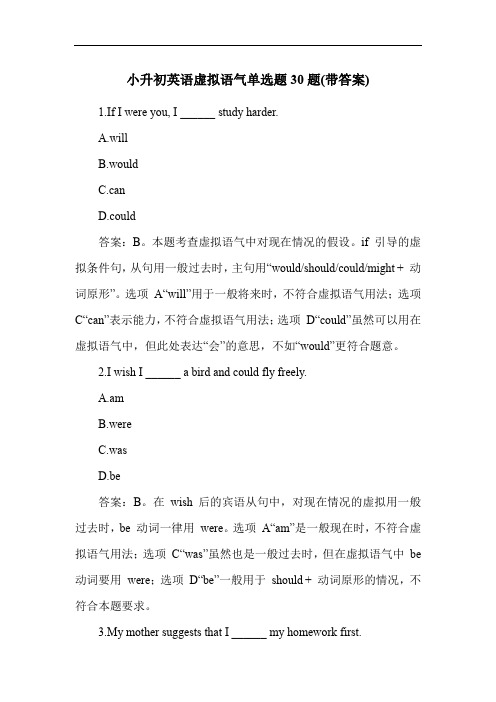
小升初英语虚拟语气单选题30题(带答案)1.If I were you, I ______ study harder.A.willB.wouldC.canD.could答案:B。
本题考查虚拟语气中对现在情况的假设。
if 引导的虚拟条件句,从句用一般过去时,主句用“would/should/could/might + 动词原形”。
选项A“will”用于一般将来时,不符合虚拟语气用法;选项C“can”表示能力,不符合虚拟语气用法;选项D“could”虽然可以用在虚拟语气中,但此处表达“会”的意思,不如“would”更符合题意。
2.I wish I ______ a bird and could fly freely.A.amB.wereC.wasD.be答案:B。
在wish 后的宾语从句中,对现在情况的虚拟用一般过去时,be 动词一律用were。
选项A“am”是一般现在时,不符合虚拟语气用法;选项C“was”虽然也是一般过去时,但在虚拟语气中be 动词要用were;选项D“be”一般用于should + 动词原形的情况,不符合本题要求。
3.My mother suggests that I ______ my homework first.B.didC.should doD.would do答案:C。
suggest 表示“建议”时,后面的宾语从句要用虚拟语气,即“should + 动词原形”,should 可以省略。
选项A“do”单独出现容易让人误以为不是虚拟语气;选项B“did”只是一般过去时,不符合虚拟语气要求;选项D“would do”用于对过去或将来的虚拟,不符合本题要求。
4.If I had more time, I ______ read more books.A.willB.wouldC.canD.could答案:B。
本题考查对现在情况的虚拟语气。
if 引导的虚拟条件句,从句用一般过去时,主句用“would/should/could/might + 动词原形”。
小升初英语虚拟语气单选题70题(答案解析)
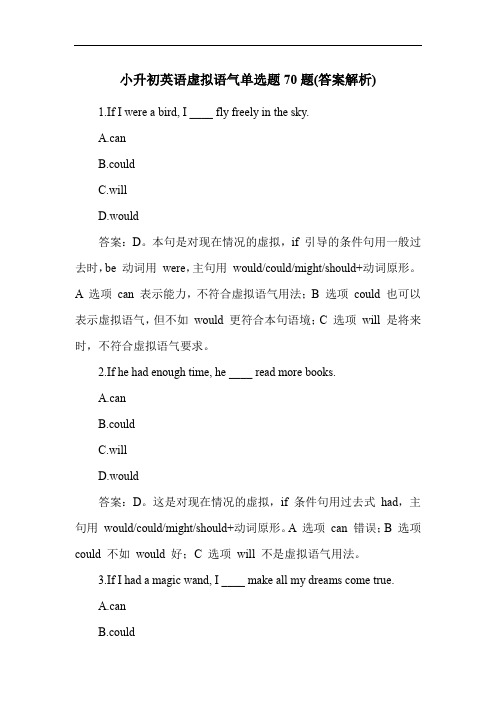
小升初英语虚拟语气单选题70题(答案解析)1.If I were a bird, I ____ fly freely in the sky.A.canB.couldC.willD.would答案:D。
本句是对现在情况的虚拟,if 引导的条件句用一般过去时,be 动词用were,主句用would/could/might/should+动词原形。
A 选项can 表示能力,不符合虚拟语气用法;B 选项could 也可以表示虚拟语气,但不如would 更符合本句语境;C 选项will 是将来时,不符合虚拟语气要求。
2.If he had enough time, he ____ read more books.A.canB.couldC.willD.would答案:D。
这是对现在情况的虚拟,if 条件句用过去式had,主句用would/could/might/should+动词原形。
A 选项can 错误;B 选项could 不如would 好;C 选项will 不是虚拟语气用法。
3.If I had a magic wand, I ____ make all my dreams come true.A.canB.couldD.would答案:D。
对现在情况的虚拟,if 条件句用过去式had,主句用would/could/might/should+动词原形。
A 选项can 不对;B 选项could 不太合适;C 选项will 不是虚拟语气。
4.If she were taller, she ____ play basketball better.A.canB.couldC.willD.would答案:D。
对现在情况虚拟,if 条件句用were,主句用would/could/might/should+动词原形。
A 选项can 错;B 选项could 也可但不如would;C 选项will 不是虚拟语气。
5.If we had a car, we ____ travel more easily.A.canB.couldC.willD.would答案:D。
小升初英语虚拟语气练习题30题
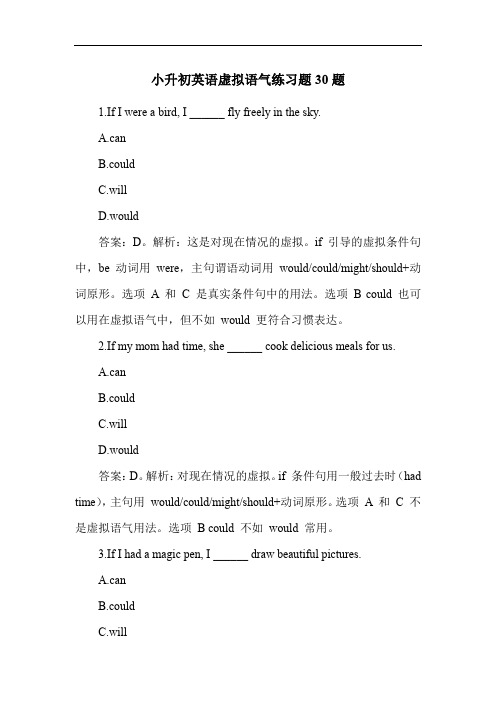
小升初英语虚拟语气练习题30题1.If I were a bird, I ______ fly freely in the sky.A.canB.couldC.willD.would答案:D。
解析:这是对现在情况的虚拟。
if 引导的虚拟条件句中,be 动词用were,主句谓语动词用would/could/might/should+动词原形。
选项 A 和C 是真实条件句中的用法。
选项B could 也可以用在虚拟语气中,但不如would 更符合习惯表达。
2.If my mom had time, she ______ cook delicious meals for us.A.canB.couldC.willD.would答案:D。
解析:对现在情况的虚拟。
if 条件句用一般过去时(had time),主句用would/could/might/should+动词原形。
选项A 和C 不是虚拟语气用法。
选项B could 不如would 常用。
3.If I had a magic pen, I ______ draw beautiful pictures.A.canB.couldC.will答案:D。
解析:对现在情况的虚拟。
if 条件句用had,主句用would/could/might/should+动词原形。
选项A 和C 不用于虚拟语气。
选项B could 也可以,但would 更合适。
4.If my brother were taller, he ______ play basketball better.A.canB.couldC.willD.would答案:D。
解析:对现在情况的虚拟。
if 条件句用were,主句用would/could/might/should+动词原形。
选项 A 和 C 错误。
选项 B could 也可,但would 更恰当。
5.If I had a lot of money, I ______ buy a big house.A.canB.couldC.willD.would答案:D。
人教版英语英语 虚拟语气技巧全解及练习题(含答案)
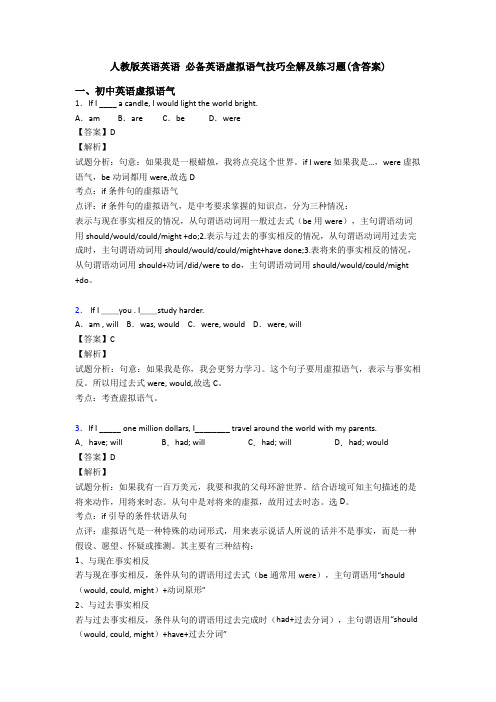
人教版英语英语必备英语虚拟语气技巧全解及练习题(含答案)一、初中英语虚拟语气1.If I ____ a candle, I would light the world bright.A.am B.are C.be D.were【答案】D【解析】试题分析:句意:如果我是一根蜡烛,我将点亮这个世界。
if I were 如果我是…,were虚拟语气,be动词都用were,故选D考点:if条件句的虚拟语气点评:if条件句的虚拟语气,是中考要求掌握的知识点,分为三种情况:表示与现在事实相反的情况,从句谓语动词用一般过去式(be用were),主句谓语动词用should/would/could/might +do;2.表示与过去的事实相反的情况,从句谓语动词用过去完成时,主句谓语动词用should/would/could/might+have done;3.表将来的事实相反的情况,从句谓语动词用should+动词/did/were to do,主句谓语动词用should/would/could/might +do。
2. If I __you . I__study harder.A.am , will B.was, would C.were, would D.were, will【答案】C【解析】试题分析:句意:如果我是你,我会更努力学习。
这个句子要用虚拟语气,表示与事实相反。
所以用过去式were, would,故选C。
考点:考查虚拟语气。
3.If I _____ one million dollars, I________ travel around the world with my parents. A.have; will B.had; will C.had; will D.had; would【答案】D【解析】试题分析:如果我有一百万美元,我要和我的父母环游世界。
结合语境可知主句描述的是将来动作,用将来时态。
小升初英语虚拟语气专项练习题及答案
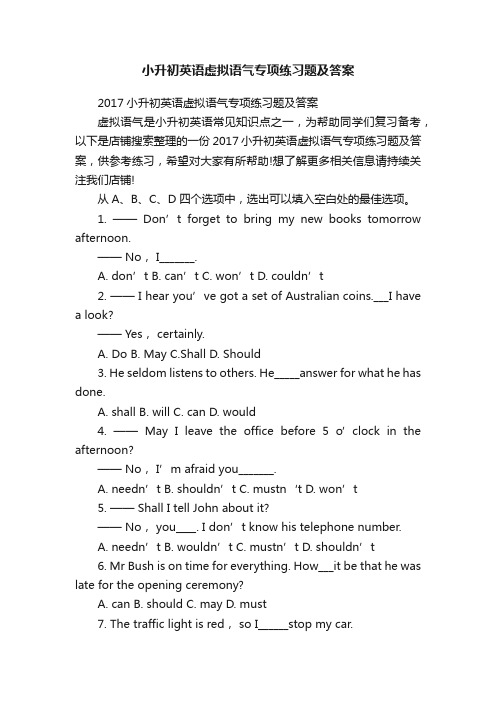
小升初英语虚拟语气专项练习题及答案2017小升初英语虚拟语气专项练习题及答案虚拟语气是小升初英语常见知识点之一,为帮助同学们复习备考,以下是店铺搜索整理的一份2017小升初英语虚拟语气专项练习题及答案,供参考练习,希望对大家有所帮助!想了解更多相关信息请持续关注我们店铺!从A、B、C、D四个选项中,选出可以填入空白处的最佳选项。
1. ——Don’t forget to bring my new books tomorrow afternoon.—— No, I_______.A. don’tB. can’tC. won’tD. couldn’t2. ——I hear you’ve got a set of Australian coins.___I havea look?—— Yes, certainly.A. DoB. MayC.ShallD. Should3. He seldom listens to others. He_____answer for what he has done.A. shallB. willC. canD. would4. ——May I leave the office before 5 o’clock in the afternoon?—— No,I’m afraid you_______.A. needn’tB. shouldn’tC. mustn‘tD. won’t5. —— Shall I tell John about it?—— No, you____. I don’t know his telephone number.A. needn’tB. wouldn’tC. mustn’tD. shouldn’t6. Mr Bush is on time for everything. How___it be that he was late for the opening ceremony?A. canB. shouldC. mayD. must7. The traffic light is red, so I______stop my car.A. mustB. have toC. canD. mustn’t8. —— What happened to the young trees we planted?—— The trees______well,but I didn’t water them.A. might growB. needn’t have grownC. would growD. would have grown9. I was really anxious about you. You___home without a word.A. mustn’t leaveB. shouldn’t have leftC. couldn’t have leftD. needn’t leave10. Children________in public very often.A. should be praisedB. shouldn’t have praisedC. shouldn’t have been praisedD. shouldn’t be prai sed11. Let’s clean the classroom, _______?A. won’t youB. shall weC. do weD. will not you12. Tom_______show his exam results to his parents.A. dare notB. daredC. dare toD. dares not to13. I don’t think he_______ a new bike.A. need to buyB. needs buyC. needD. need buy14. —— Nacy_________ the letter from her mother.—— No,she can’t have. The postman hasn’t come yet.A. can receiveB. can have receivedC. must have receivedD. must receive15. She________the film. She knows nothing about it.A. can’t seeB. can’t have seenC. must seeD. mustn’t have seen16. They must have been here the day before yesterday,____?A. mustn’t theyB. didn’t theyC. mustn’t have theyD. had they17. ——I didn’t see her yesterday.—— Oh, but you _______________.A. must haveB. ought toC. should haveD. cannot have18. —— Must I take a bus ?—— No, you____. You can walk from here.A. must notB. don’tC. don’t have toD. had better not to19. —— Why do you make me do so?—— I am sorry that you________do such a thing.A. wouldB. canC. shouldD. may20. —— Will you stay for lunch?—— Sorry, _____. My brother is coming to see me.A. I mustn’tB. I can’tC. I needn’tD. ?won’t21. What would have happened____, as far as the river bank?A. if Bob has walked fartherB. if Bob should walk fartherC. had Bob walked fartherD. if Bob walked farther22. You didn’t let me drive. If we____in turn, you___ so tired.A. drove; didn’t getB. drove; wouldn’t getC. were driving; wouldn’t getD. had driven; wouldn’t have got23. Without electricity human life_______quite different today.A. isB. will beC. would have beenD. would be24. Oh, Janne,you’ve broken another glass. You ought ____when you washed it.A. be carefulB. to careC. have caredD. to have been careful25. I______often go fishing when I lived in the countryside.A. shouldB. wouldC. couldD. might26. He______rather stay at home than go to the cinema with you.A. shouldB. mightC. wouldD. had better27. It’s high time we_______ to the theater.A. willB. shallC. are going toD. went28. —— Could I use your telephone?—— Yes, of course you _____________.A. couldB. willC. canD. might29. It’s strange that they_____nothing about this matter.A. knowB. would knowC. knowsD. knew30. I wish you______go with me tomorrow.A. willB. wouldC. shallD. can31. —— Do you still remember the day when we went to the Great Wall?——I can’t remember it well,but______sometime last autumn?A. might it beB. could it have beenC. could it beD. must it have been32. ——I can’t get through to the general manager’s office anyhow.—— The line is busy. Someone_____the telephone.A. must useB. usesC. must have been usingD. must be using33. He suggests we______to the cinema at once, otherwise we will be late.A .must go B. go C. will go D. would go34. When a pencil is partly in a glass of water, it looks as if ____.A. breaksB. has brokenC. were brokenD. had been broken35. The general ordered that the thief____.A. be punishedB. would punishC. would be punishedD.should punish36. If only I_____how to operate a computer as you do!A. had knownB. would knowC. should knowD. knew37. It is surprising that he____at the meeting.A. wasB. beC. isD. were38. If you____wait a moment,I’ll go and find our manager.A. canB. shouldC. willD. must39. —— Do you think he will do me a favor?——As far as I know,he is the last one to help others. He____be prepared to give you a hand, though.A. mightB. mustC. canD. should40. Even though I’d hurt my leg, I______ swim back to the river bank.A. couldB. mightC. had toD. was able to。
- 1、下载文档前请自行甄别文档内容的完整性,平台不提供额外的编辑、内容补充、找答案等附加服务。
- 2、"仅部分预览"的文档,不可在线预览部分如存在完整性等问题,可反馈申请退款(可完整预览的文档不适用该条件!)。
- 3、如文档侵犯您的权益,请联系客服反馈,我们会尽快为您处理(人工客服工作时间:9:00-18:30)。
小升初英语虚拟语气(三)
省去从句或主句的虚拟结构
虚拟结构中的从句或主句有时形式上可以省略,但意义上却仍存在。
1)省去了条件从句的虚拟结构。
如:
That would be fine.那就太好了。
(省去了if you should do it或类似条件)
You might stay here forever.你可以永远呆在这里。
(省去了if you wanted协或类似条件)
I would not have done it.我是不会做那件事的。
(省去了if were you或类似条件)
[注]虚拟结构中省去的从句有时并不容易找出。
如:
Who would have thought of it ? 谁会想到是这样的呢?
2)省去了结果主句的虚拟结构(常用以表示愿望)。
如:
If he were here!假如他在这里该多好啊!
If I had never married.如果我从未结婚就好了。
这种结构也常用if only开头。
如:
If only I could help you! 假如我能帮助你,那该是多好啊!
If only I were ten years younger!我要是能年轻十岁该多好啊!
If you would only try harder!你如再努力一试就好了。
(only亦可置于would等助动词之后)
[注]有时if only只表条件,不表愿望。
如:
If only I had known earlier,I'd have sent you a telegram.我只要知道得早一点,就会拍电报给你了。
虚拟语气的其他用法
虚拟语气用在主语从句中
在It is natural(necessary,strange,important) that...这类句型里,that所引导的主语从句中的谓语动词常用should加动词原形。
如:
It is quite natural that he should think so.他这样想是很自然的事。
It is strange that he Should have gone away without telling us. 真奇怪,他没有通知我们就走掉了。
It is necessary that the question should be settled at once.必须马上解决这个问题。
It is important that we should speak politely. 我们说话要有礼貌,这是很重要的。
It is imperative that we should practise criticism and self-criti - cism. 应当进行批评与自我批评。
虚拟语气用在宾语从句中
下列两种宾语从句须用虚拟语气:
1)在动词wish后的宾语从句(常常省去连词that),表示不可实现的愿望。
从句中的动词如用过去式,则表示与现在事实相反(如下面第一、二例句);如用过去完成式,则表示与过去事实相反(如下面第三、四例句)。
如:
I wish I were a pilot.但愿我是个飞行员。
I wish I knew how to operate the machine.我要是会操作这架机器该有多好啊! (= I'm sorry I don't know.)
I wish he hadn't gone.他要是没走该多好!(= I'm sorry he has gone.)
We wish you had come to our New Year's party.我们真希望你来参加我们的新年联欢会。
(= but you did not)
动词wish如果是过去式,后面宾语从句的动词的虚拟语气形式不变,仍用过去式或过去完成式。
如:
She wished she knew how to play golf. 她但愿会打高尔夫球。
(和过去事实相反)
I wished I hadn't been so forgetful. Then I shouldn't have missed the concert.我要是不这样忘事该多好,那我就不会不去听音乐会。
(和过去的过去的事实相反) [注]有时在宾语从句中可用would或might加动词原形,表示有可能实现的愿望。
如:.
I wish he,might stay with me.我希望他和我住在一起。
He wishes I would go with him.他希望我和他一起去。
I wish you would be quiet.我希望你安静一些。
2)动词demand(要求),suggest(建议),order (命令),insist(坚持),propose(建议)等后面的宾语从句,用should(用于所有的人称)加动词原形来表示虚拟语气。
如:
I suggest that we should hold a meeting tonight.我建议今晚开个会。
The chairman proposed that we Should discuss the question.主席提议我们讨论这个问题。
Most students insist that they should have more English classes. 多数同学坚持要多上英语课。
[注]这种结构往往可不用should,尤其在美国,只用动词原形(用于所有的人称)。
如上面三例只用hold,discuss和have,不用should hold,should discuss和should have。
又如:
I suggest that we make a new expertinent.我建议进行新的试验。
I propose that the matter be put the vote at once.我提议把这个问题马上付表决。
虚拟语气用在状语从句中
由as if或as though所引导的状浯从句表示比较或方式时,从句中的谓语动词常用虚拟语气。
动词形式用动词的过去式(be用were)或had + 过去分词。
如:
My mother locked after the orphan as if he were her own child. 我母亲照料这个孤儿像自己孩子一样。
You speak as if you had really been there.你谈得好像你真的到过那里似的。
注意下面句中的as if从句用作表语。
如:
It looks as if it might rain,天好像要下雨似的。
[注]连词lest和in case所引导的状语从句中的谓语动词亦用虚拟语气。
例见15.33和15.30 虚拟语气用在定语从句中
It is time (that)…句型中的定语从句里的谓语动词常用虚拟浯气表示将来,动词形式用动词的过去式:意思是"该干某件事了,时间已经有些晚了"。
如:
It is time we left.我们该走了。
It is time we went to bed.我们该睡觉了:
It is time we summed up our results.我们该总结我们的成绩了。
虚拟语气用在简单句中
下面是虚拟语气用在简单句中较常见的两种情况,皆表祝愿。
如:
1)动词原形1ive用在Long live…中。
如:
Long live the Communist Party of China! 中国共产党万岁!
Long live the people! 人民万岁!
(1ive在此也是虚拟语气的一种动词形式,不可改为lives)
2)May用在句子开头(多用在正式的文体中)。
如:
May good luck be yours.祝你顺利。
May you be happy.祝你快乐。
May you do even better! 祝你取得更大成就!。
